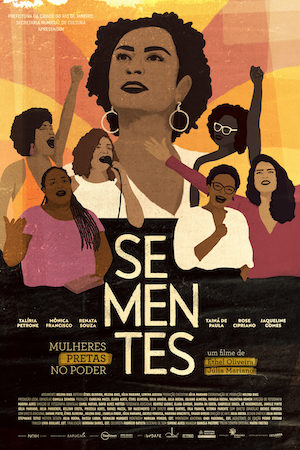
Seeds: Black Women in Power 2020
Distributed by Pragda, 302 Bedford Ave., #136, Brooklyn, NY 11249
Produced by Julia Rocha, Julia Araújo, Clara Alves and Carolina Mazzi
Directed by Júlia Mariano and Éthel Oliveira
Streaming, 105 mins
High School - General Adult
Activism; Gender Studies; Politics
Date Entered: 04/28/2023
Reviewed by Monique Threatt, Indiana University, Herman B Wells Library, Bloomington, IN“In 2018 elections, 4,398 black women applied for legislative positions. A 93% increase in the number of black women candidates in comparison to the previous election.”
Winner of the Best Feature Film at the Montreal International Black Film Festival (MIBFF), this riveting documentary highlights the fight for justice and representation following the political execution of Brazil’s councilwoman Marielle Franco and her driver, Anderson Pedro, in advance of elections.
In spite of abuse, and threats from police officials and opponents, Black women candidates & activists step up to organize and mobilize constituents in their efforts to be seen and represented in the political landscape. Not only are these political candidates and activists preserving the legacy and memory of Marielle Franco, but they bring to the forefront the social, economic, and political inequities facing Black women, as well as the injustices against LGBQT+ communities. Black, Indigenous and people of color (BIPOC) communities are disproportionately denied access to clean water, greater education and employment opportunities, quality food and health care, and, overall, better living conditions.
The film follows and interviews several activists, candidates, and journalists such as Pastor Mônica Francisco, Rose Cipriano, Thais Ferreira, Jacqueline De Jesus, Tainá De Paula, Talíria Petrone, Praça Seca, Renata Souza, among others. In the months leading up to the 2018 election, candidates espouse similar campaign messages to combat an oppressive regime, to acknowledge that black lives matter, to uplift cisgender and trans black women, as well as a call to stop the criminalization and demeaning stereotypes unceremoniously attributed to those living in Brazil’s infamous favelas, a term used to identify “a slum or shantytown located within or on the outskirts of the country’s large cities, especially Rio de Janeiro and São Paulo.”
This documentary serves as an excellent resource to highlight the power of Black women and what they can accomplish via activism, perseverance, and the courage to face adversity head on.
I highly recommend this film for those studying activism, politics, and gender studies. In Portuguese with English, Spanish and Portuguese subtitles.
Awards: Montreal International Black Film Festival (MIBFF), Best Feature Film
Published and licensed under the Creative Commons Attribution 4.0 license. Anyone can use these reviews, so long as they comply with the terms of the license.